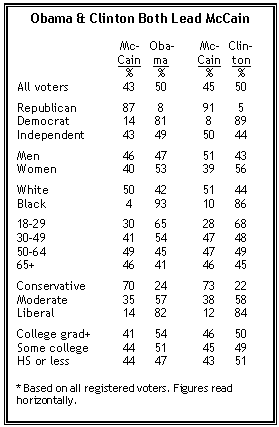
Obama and Clinton both hold modest leads over McCain in a general election matchup; Obama has a 50% to 43% lead and Clinton holds a 50% to 45% edge. But Clinton draws more universal support among Democrats (89%) than does Obama (81%). Conversely, Obama leads McCain slightly among independents (49% to 43%), while McCain edges Clinton among this group by the same margin. There is no evidence that either Obama or Clinton attracts much support from Republicans.
Obama and Clinton both show strength among younger voters and women. But there are demographic differences evident in their respective matchups with McCain. Obama leads McCain among 30-49 year-olds by 13 points, while these voters are divided almost evenly if the race is between Clinton and McCain. Both Democrats run about even with McCain among voters ages 50 and over.
While women favor either possible Democratic nominee over McCain in a general election matchup, Obama fares somewhat better than Clinton among men. Obama runs even with McCain among all male voters (47% Obama to 46% McCain), but McCain holds a 51% to 43% advantage over Clinton among men.
Obama’s Appeal to Independents
Obama has much greater personal appeal to independent voters than does either McCain or Clinton. Fully 63% of independents rate Obama favorably, nearly twice the percentage expressing an unfavorable view of him (32%). The balance of opinion toward McCain also is favorable, but by a much slimmer 51% to 38% margin. The share of independents with an unfavorable view of Clinton is substantially higher (50%), while just 45% view her favorably.
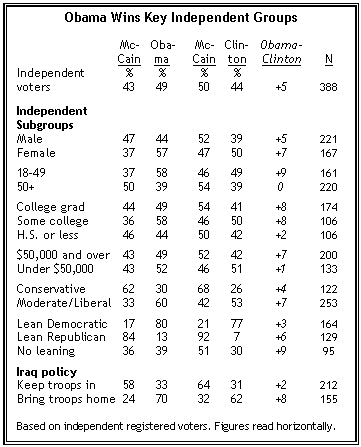
Roughly half of independent voters (51%) say they personally find Obama very likeable, which is far greater than the percentages saying they find either Clinton (18%) or McCain (13%) very likeable. A substantial minority of independents says that Clinton is not likeable; 37% express this view about Clinton, compared with 19% for McCain and just 8% for Obama.
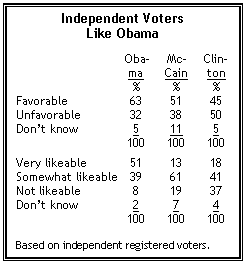
In a general election test against McCain, Obama runs slightly better than Clinton among most subgroups of independent voters. But he shows particular strength among younger and well-educated independents. Obama leads McCain by 21 points among independents under age 50 (58% to 37%); these same younger independents split their vote almost evenly in a race between Clinton and McCain (49% vs. 46%).
In addition, Obama holds a slight 49% to 44% edge among independent college graduates by five points. Clinton trails McCain among this group by 13 points (41% to 54%).
Obama also holds a 20 point lead over McCain among female independent voters (57% to 37%). Clinton’s edge over McCain among independent women is just three points (50% to 47%).
Clinton Draws More Support Among Democrats
The vast majority of Democratic voters say they would support either Obama or Clinton over McCain. But in an Obama-McCain matchup, 14% of Democratic voters say they would support McCain, compared with 8% who would do so if Clinton is the nominee.
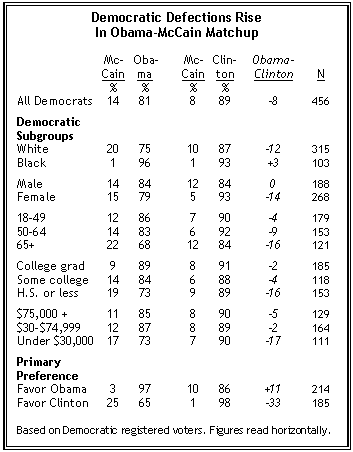
One-in-five white Democrats (20%) say that they will vote for McCain over Obama, double the percentage who say they would switch sides in a Clinton-McCain matchup (10%). Roughly the same number of Democrats age 65 and older say they will vote for McCain if Obama is the party’s choice (22%). Obama also suffers more defections among lower income and less educated Democratic voters than does Clinton.
In addition, female Democrats look at the race differently depending on the matchup. While 93% of women in the party say they would vote for Clinton over McCain, just 79% say they would support Obama over McCain.
A quarter of Democrats (25%) who back Clinton for the nomination say they would favor McCain in a general election test against Obama. The “defection” rate among Obama’s supporters if Clinton wins the nomination is far lower; just 10% say they would vote for McCain in November, while 86% say they would back Clinton.
Obama’s Foreign Policy Challenge
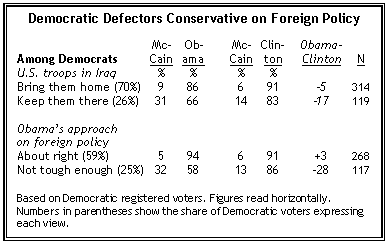
Obama suffers a significant number of defections from Democrats with more conservative foreign policy views, particularly on the issue of Iraq. A large majority of Democrats — 70% — say they want U.S. troops in Iraq to return home as soon as possible; these Democrats overwhelmingly favor either Obama or Clinton over McCain. But roughly a quarter of Democrats believes the troops should remain in Iraq until the situation has stabilized. These voters would support Clinton over McCain by greater than five-to-one (83% vs. 14%). Democrats who support maintaining U. S. forces in Iraq would support Obama over McCain by a smaller margin (66% to 31%).
Similarly, concerns about Obama’s foreign policy among a minority of Democrats also cut into Obama’s standing. A quarter of Democratic voters believe that Obama would not be tough enough in his approach to foreign policy issues; about a third (32%) of these Democrats say they will vote for McCain if Obama wins the nomination. Just 13% of these same Democrats would switch sides if Clinton wins the nomination.
Wary Republicans Rally to McCain
There is little evidence that a significant number of Republican voters find either Obama or Clinton to be acceptable alternatives to John McCain — fully 87% back him in a contest against Barack Obama, and 91% back him if Clinton wins the Democratic nomination.

Yet many Republicans are skeptical about McCain’s commitment to conservative positions. Overall, 38% of Republicans, including 46% of conservative Republicans, believe that McCain’s positions on issues are not conservative enough. But that perception does not appear to have hurt McCain’s image, or support, among GOP voters.
Only a minority of Republicans (31%) believe that differences and disagreements within the party will keep many Republicans from supporting McCain. Instead, roughly six-in-ten (59%) say that the Republican Party will unite solidly behind McCain as their candidate. Notably, the belief that the party can unite behind McCain is equally widespread among both conservative (61%) and moderate and liberal (60%) Republicans.
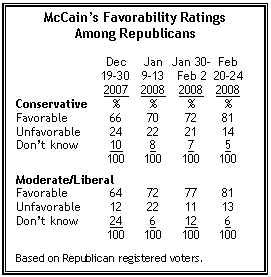
In fact, John McCain’s overall favorability rating among Republican voters has risen sharply, from 65% on the eve of the Iowa caucuses to 80% today. This increase has come across the ideological spectrum. Since late December, McCain’s favorability among conservative Republicans has increased from 66% to 81%, and it is up from 64% to 81% among moderates and liberals in the party.
In fact, conservative Republican voters now rate McCain about as favorably as they do George W. Bush; 81% have a favorable opinion of McCain while 85% have a favorable opinion of Bush. McCain is held in substantially higher regard than the president among moderate and liberal Republicans (81% favorable vs. 63% for Bush).
McCain Seen as Less Divisive Than Dole in 1996
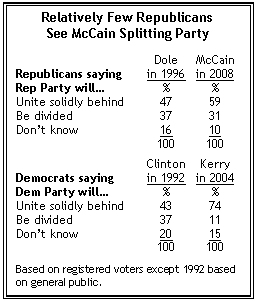
The proportion of Republican voters who believe that their party will unite solidly behind John McCain (59%) exceeds the share of Republicans voters who thought that about Bob Dole in 1996 (47%). Just 31% now say that differences and disagreements in the party will keep many Republicans from supporting McCain, compared with 37% who said that about Dole in 1996.
In 1992, Democrats were divided about prospects the party would unite behind Bill Clinton. Four years ago, an overwhelming proportion of Democrats expected the party to unite behind John Kerry.


